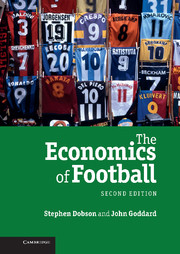Book contents
- Frontmatter
- Contents
- Preface
- Acknowledgements
- List of figures
- List of tables
- 1 Introduction
- 2 The economic theory of professional sports leagues
- 3 Competitive balance, uncertainty of outcome and home-field advantage
- 4 Forecasting models for football match results
- 5 Game theory and football games
- 6 English professional football: historical development and commercial structure
- 7 Determinants of professional footballers' salaries
- 8 Professional footballers: employment patterns and racial discrimination
- 9 The football manager
- 10 The football referee
- 11 Spectator demand for football
- 12 Gambling on football
- 13 Football around the world: France, Germany, Brazil, Japan and China
- 14 The economics of the World Cup
- References
- Index
4 - Forecasting models for football match results
Published online by Cambridge University Press: 05 June 2012
- Frontmatter
- Contents
- Preface
- Acknowledgements
- List of figures
- List of tables
- 1 Introduction
- 2 The economic theory of professional sports leagues
- 3 Competitive balance, uncertainty of outcome and home-field advantage
- 4 Forecasting models for football match results
- 5 Game theory and football games
- 6 English professional football: historical development and commercial structure
- 7 Determinants of professional footballers' salaries
- 8 Professional footballers: employment patterns and racial discrimination
- 9 The football manager
- 10 The football referee
- 11 Spectator demand for football
- 12 Gambling on football
- 13 Football around the world: France, Germany, Brazil, Japan and China
- 14 The economics of the World Cup
- References
- Index
Summary
Introduction
Chapter 4 describes the estimation and application of goals-based and results-based forecasting models for match outcomes in football, recorded in the form of either goals scored and conceded by the two teams, or in the form of ‘win-draw-lose’ match results. Both types of forecasting model are estimated by fitting regression models to past match results data. A diagonal-inflated bivariate Poisson regression is used for the goals-based model, and an ordered probit regression is used for the results-based model. Both models draw on an extensive set of covariates, reflecting past goal-scoring performance and match results over the preceding 24 calendar months, the significance of the match for end-of-season championship, promotion or relegation outcomes, the current involvement of the teams in the FA Cup or European tournaments, the average attendances attracted by both teams, and the geographical distance between the home stadia of the two teams.
Section 4.1 reviews the previous academic literature on modelling the outcomes of football matches. Section 4.2 describes the specification and estimation of a goals-based match results forecasting model. Section 4.3 describes the use of the goals-based model to generate out-of-sample forecasts, in probabilistic form, for either goals or ‘win-draw-lose’ match results. Sections 4.4 and 4.5 describe the estimation and application of a results-based forecasting model. Finally Section 4.6 draws some comparisons between the forecasting performance of the goals-based and results-based models, and between the probabilities generated by these models and a set of implied probabilities derived from the quoted odds (prices) of a selection of high-street and internet bookmakers for fixed-odds betting on match results.
- Type
- Chapter
- Information
- The Economics of Football , pp. 79 - 105Publisher: Cambridge University PressPrint publication year: 2011



